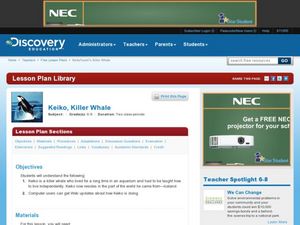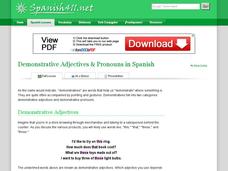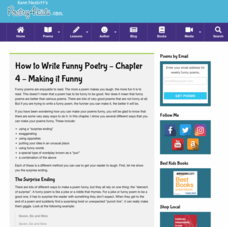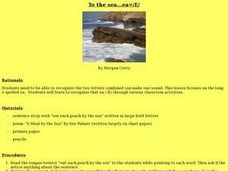Curated OER
Keiko, Killer Whale
Middle schoolers will create a children's book on Keiko, the killer whale, that was rehabilitated and returned to the wild after living in an aquarium. In small groups, they conduct internet research to find out the history and current...
Curated OER
The Little Red Hen
Young readers access prior knowledge of how wheat becomes bread. Using "The Little Red Hen" story, learners make predictions of the events. Extension activities include singing a song about the story and making a list of...
Teaching English
In Flanders Fields
War is one of the most profound human experiences in history, and is often best depicted in works of art and literature. Introduce class members to the poetry of World War I with this resource that uses John McCrae's "In Flanders Fields"...
Kelly's Kindergarten
March Daily Activities
There's a pot of gold at the end of the school year! Use a month's worth of reading, writing, and counting activities to keep kids learning through the month of March.
Curated OER
Quick and Sticky Context Clues
Discuss strategies for defining word your young readers don't know. They read sentences with key words covered by sticky notes and guess from the context what the word might be. They peek at the first letter and guess again.
Curated OER
Accent Marks & Special Characters in Spanish
Check out this clear description of how and when to use accent marks and special characters. The information, necessary to truly understand the purpose of special characters and accent marks would make a great reference material for...
Curated OER
Demonstrative Adjectives & Pronouns in Spanish
Encourage mastery of demonstrative adjectives and demonstrative pronouns. Try out the presentation to introduce your class to the concepts and practice with two integrated exercises. The At a Glance tab and Full Lesson tab can be used...
Poetry4kids
How to Write Funny Poetry — Chapter 4: Making It Funny
You've got your topic—now how do you make your poem funny? Explore ways to make a poem humorous, including puns, exaggeration, silly words, and surprising endings, with a helpful poetry lesson.
Curated OER
You Too Can Haiku
Students conduct Internet research and explain the history of Haiku. After listening and reading various examples of Haiku, students use their own vocabulary and practice their math skills to determine the correct number of syllables...
Curated OER
To the Sea
Improve pronunciation and phonemic awareness in your first and second graders! With this plan, they distinguish between the sounds for short vowel e and long vowel e. They are introduced to the vowel patterns that comprise long vowel...
Curated OER
Breath/Breathe
In this breath or breathe worksheet, students choose the correct word to complete each sentence. Students choose breath or breathe for 4 sentences.
Curated OER
Hickory Dickory Dock
Students pick out the sounds and -ck written in words. They are taught how to correctly say the sound with their mouth and read Hickory Dickory Dock. Words with the ck sound are underlined for the student's to notice. As an...
Curated OER
Repetition
In this repetition worksheet, 4th graders make a word card for repetition, find repetition and other poetic devices in poems, and answer short answer questions. Students complete 3 activities.
Curated OER
Home Spelling Practice Review Unit 5
In this spelling review worksheet, 1st graders read the four lists of short a and short e words and play a Clues game. Students complete 2 activities.
Curated OER
"A" What Did You Say?
Students complete a variety of activities related to the long /a/ sound represented by the /ay/ correspondence. They spell different words containing the /ay/ correspondence using letter manipulatives, and identify words they hear the...
Curated OER
Money, Money, Honey Bunny!
Students determine the differences between goods and services, and saving and spending. For this economics lesson, students listen to a rhyming story about a bunny with money. They play a matching game with the associated cards and work...
Curated OER
Set a Poem to Music
Fun awaits both you and your class as you embark on a musical activity. After discussing different rhythmic meters they choose a poem to set to music. The poem must rhyme and be set to a melody in the key of C Major. Because the activity...
Curated OER
Teddies
Here's a really cute lesson that utilizes all of your children's teddy bears. Each pupil brings their favorite teddy bear to school. The lesson has many wonderful suggestions for learning activities that can be done with the bears once...
Ed Worksheets
Read the Story
Want to boost your readers' comprehension skills and strategies? Look to these five pages, each with a short story and questions to answer covering main idea, facts, sequence of events, context clues, conclusions, and making...
University of North Carolina
Poetry Explications
Explication may sound like a fancy word, but it's just a fancy way to say analysis. Using a handout on poetry explications, part of a larger series on specific writing assignments, writers learn how to break down and analyze a poem. The...
Georgia Department of Education
Exploring Poetry and Poets
Combine the study of poetry and non-fiction texts with this complete and ready-to-use six-week unit. After reading numerous poems from local writers and compiling a personal anthology, high schoolers find and read a memoir or biography...
Curated OER
Old Mother Twitchett
Young scholars view and discuss the a-rhyme-a-week poster"Old Mother Twitchett." They review the vocabulary from the chart and then focus on the pictures. Each student then chants the rhyme as they are taught the words to the riddle rhyme.
Curated OER
Sing Me a Story!
Sixth graders explore lyrics, phrases, and the beats in each phrase. They select a nursery rhyme, set it to a simple tune they already know, and match the tune with the same number of beats per phrase with a poem with the identical...























